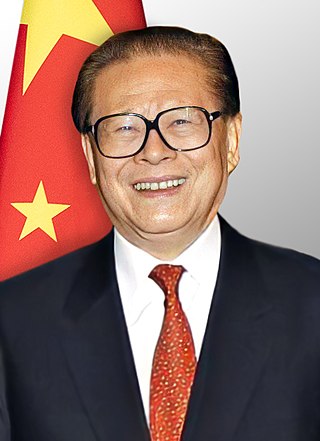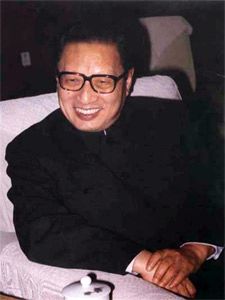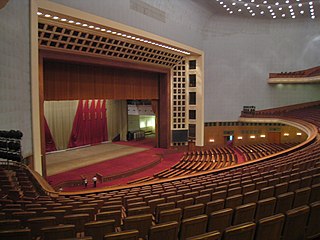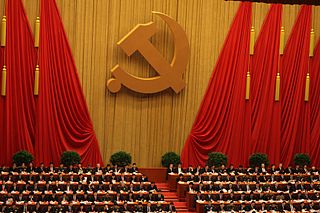
Jiang Zemin was a Chinese politician who served as general secretary of the Chinese Communist Party (CCP) from 1989 to 2002,as chairman of the Central Military Commission from 1989 to 2004,and as president of China from 1993 to 2003. Jiang was the third paramount leader of China from 1989 to 2002. He was the core leader of the third generation of Chinese leadership,one of four core leaders alongside Mao Zedong,Deng Xiaoping,and Xi Jinping.

The Politburo Standing Committee (PSC),officially the Standing Committee of the Political Bureau of the Central Committee of the Communist Party of China,is a committee consisting of the top leadership of the Chinese Communist Party (CCP). Historically it has been composed of five to eleven members,and currently has seven members. Its officially mandated purpose is to conduct policy discussions and make decisions on major issues when the Politburo,a larger decision-making body,is not in session. According to the party's constitution,the General Secretary of the Central Committee must also be a member of the Politburo Standing Committee.

Hu Jintao is a Chinese retired politician who served as the general secretary of the Chinese Communist Party (CCP) from 2002 to 2012,the president of China from 2003 to 2013,and chairman of the Central Military Commission (CMC) from 2004 to 2012. He was a member of the CCP Politburo Standing Committee,China's de facto top decision-making body,from 1992 to 2012. Hu was the fifth paramount leader of China from 2002 to 2012.

The Princelings,also translated as the Party's Crown Princes,are the descendants of prominent and influential senior communist officials in the People's Republic of China. It is an informal,and often derogatory,categorization to signify those believed to be benefiting from nepotism and cronyism,by analogy with crown princes in hereditary monarchies. Many of its members hold high-level political and business positions in the upper echelons of power.

Wu Bangguo is a Chinese retired politician. Wu served as the second-ranking member of the Politburo Standing Committee of the Chinese Communist Party from 2002 to 2012,and as Chairman of the Standing Committee of the National People's Congress from 2003 to 2013.

Jia Qinglin is a retired senior leader of the People's Republic of China and of the ruling Chinese Communist Party (CCP). He was a member of the CCP's Politburo Standing Committee,the party's highest ruling organ,between 2002 and 2012,and Chairman of the National Committee of the People's Political Consultative Conference between 2003 and 2013.

Huang Ju was a Chinese politician and a high-ranking leader in the Chinese Communist Party (CCP). He was a member of the Politburo Standing Committee of the CCP,China's top decision making body,between 2002 until his death in 2007,and also served as the first-ranked vice premier of China beginning in 2003. He died in office before he could complete his terms on the Standing Committee and as vice premier.
Wu Guanzheng,also spelled as Wu Kuan-cheng is a former Chinese politician and one of the major leaders of the Chinese Communist Party during the administration of Hu Jintao. He served on the Politburo Standing Committee,the country's top ruling body,from 2002 to 2007. During that time he also served as the Secretary of the Central Commission for Discipline Inspection of the Chinese Communist Party,the party's anti-graft body. He had a lengthy political career,having served as mayor of Wuhan,Governor then Party Secretary of Jiangxi,then party chief of Shandong. Wu retired in 2007 and left public life.
The Shanghai clique,also referred to as the Shanghai gang,Jiang clique,or Jiang faction,refers to an informal group of Chinese Communist Party (CCP) officials who rose to prominence under former CCP General Secretary Jiang Zemin while he served as the party chief and mayor of Shanghai.
Generations of Chinese leadership is a term historians use to characterize distinct periods of the leadership of the Chinese Communist Party (CCP) and,by extension,successive changes in the ideology of the CCP. Historians have studied various periods in the development of the government of the People's Republic of China (PRC) by reference to these "generations".

The 16th National Congress of the Chinese Communist Party was held in Beijing between November 8 and 14,2002. It was preceded by the 15th National Congress and was succeeded by the 17th National Congress. 2,114 delegates and 40 specially invited delegates represented the party's estimated 66 million members.
The term Tsinghua clique refers to a group of Chinese Communist Party (CCP) politicians that have graduated or have taught at Tsinghua University. They are members of the fourth generation of Chinese leadership,and are purported to hold powerful reformist ideas. Just like their predecessors,they attach great importance to socialism with Chinese characteristics. Their ascendance to power is likely to have begun in 2008 at the CCP's 17th National Congress.

Song Ping is a Chinese Communist revolutionary and a retired high-ranking politician. He was a member of the Politburo Standing Committee of the Chinese Communist Party. Song is considered the only living member of the Second Generation of Chinese Leadership.

Qiao Shi was a Chinese politician and one of the top leaders of the Chinese Communist Party (CCP). He was a member of the party's top decision-making body,the Politburo Standing Committee,from 1987 to 1997. He was a contender for the paramount leadership of China,but lost out to his political rival Jiang Zemin,who assumed the post of General Secretary of the party in 1989. Qiao Shi instead served as Chairman of the National People's Congress,then the third-ranked political position,from 1993 until his retirement in 1998. Compared with his peers,including Jiang Zemin,Qiao Shi adopted a more liberal stance in political and economic policy,promoting the rule of law and market-oriented reform of state-owned enterprises.

The 17th National Congress of the Chinese Communist Party was held in Beijing,China,at the Great Hall of the People from 15 to 21 October 2007. Congress marked a significant shift in the political direction of the country as CCP General Secretary Hu Jintao solidified his position of leadership. Hu's signature policy doctrine,the Scientific Development Concept,which aimed to create a "Socialist Harmonious Society" through egalitarian wealth distribution and concern for the country's less well-off,was enshrined into the Party Constitution. It was succeeded by the 18th National Congress of the Chinese Communist Party.
The 16th Central Committee of the Chinese Communist Party was in session from 2002 to 2007. It held seven plenary sessions. It was set in motion by the 16th National Congress of the Chinese Communist Party. The 15th Central Committee preceded it. It was followed by the 17th Central Committee of the Chinese Communist Party.
The 15th Central Committee of the Chinese Communist Party was in session from 1997 to 2002. The 14th Central Committee preceded it. It was followed by the 16th Central Committee of the Chinese Communist Party. This was the first Central Committee that current CCP general secretary Xi Jinping was elected to,as an alternative member.
The 14th Central Committee of the Chinese Communist Party was in session from 1992 to 1997. It held seven plenary sessions. It was preceded by the 13th Central Committee. It was elected by the 14th National Congress of the Chinese Communist Party and in turn elected the 14th Politburo of the Chinese Communist Party.

The 18th National Congress of the Chinese Communist Party was held November 8-15,2012 at the Great Hall of the People. It was preceded by the 17th National Congress of the Chinese Communist Party. Due to term limits and age restrictions,seven of the nine members of the powerful Politburo Standing Committee (PSC) retired during the Congress,including Hu Jintao,who was replaced by Xi Jinping as General Secretary of the Chinese Communist Party. The Congress elected the 18th Central Committee of the Chinese Communist Party,and saw the number of Politburo Standing Committee seats reduced from nine to seven. It was succeeded by the 19th National Congress of the Chinese Communist Party.
In modern Chinese politics,a leadership core or core leader refers to a person who is recognized as central to the leadership of the Chinese Communist Party (CCP). Four individuals so far have been given this designation:Mao Zedong,Deng Xiaoping,Jiang Zemin,and Xi Jinping. The leader of the fourth generation,Hu Jintao,has never been referred to as core throughout his term as General Secretary. The designation is not a formal title and does not hold legal weight,but its use in official party documentation gives its holder a precisely defined place in theory on their relative standing to the rest of the CCP leadership. The leadership core operates as part of the Leninist concept of democratic centralism,and is intended to represent a vital center rather than a hierarchical peak,which differentiates it from the role of paramount leader. Although all core leaders have also been paramount leaders,not all paramount leaders are or have been designated 'leadership core'.












